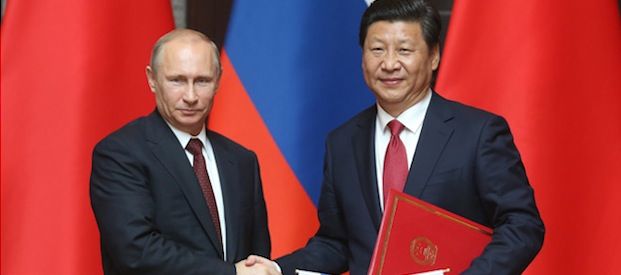
Russia and China are joining forces to create a new aircraft that they say will rival Boeing and Airbus planes.
The cost of the construction hasn’t yet been revealed, but according to experts its expected to cost between $7 – $12 billion.
Russia-insider.com reports:

BYPASS THE CENSORS
Sign up to get unfiltered news delivered straight to your inbox.
You can unsubscribe any time. By subscribing you agree to our Terms of Use
The new airliner will not be a simple knock-off of current designs by Boeing and Airbus, the present industry giants, especially in the large-airliner field.
Brazil’s Embraer has made significant inroads on the trainer aircraft/regional jet market, but does not at present build a large airliner. According to defenceWeb, such a collaboration would “end the duopoly of Airbus and Boeing in the wide-body long-range aircraft market.”
The idea of a Russian/Chinese design being an actual threat to Airbus and Boeing inspired considerable ridicule over at Airliners.Net, generating comments like “Let’s dream on for another 15-20 years if this so-called commercial project ever gets off the ground between Russia and China”, and “They could call it the Illusion 97” (that one was actually pretty funny), and “However, I do have doubts about their ability to design low-cost, hyper-efficient, complex industrial projects using multiple vendors in multiple countries. Nothing works in Russia…not because it’s bad but there is always a breakdown somewhere in the system.”
This sort of uninformed from-the-hip analysis underlines a shocking lack of understanding of the technological capability of Russian aircraft designers, exemplified in the Sukhoi PAK FA T-50, which could blow the wheels off the sluggish and overpriced Lockheed Martin like a Lamborghini passing an AMC Gremlin.
It’s quite true that building a great fighter aircraft does not necessarily translate to an ability to build a great commercial design. However, those who are piling on to ridicule the notion that puny Russia and clumsy China could ever dent Boeing and Airbus’s domination of the global market are missing something significant:
Russia and China do not need to sell their new aircraft to a variety of critical markets used to the notion that westerners are the only ones who can build anything technical. They simply need to use the new airliner themselves, and stop buying Boeing and Airbus products.
Air China’s current fleet is almost entirely Boeing and Airbus. Aeroflot’s fleet, too.
This stands to reason, as the two companies almost entirely dominate the industry.
But, consider. According to Boeing’s projections, “In developed markets, demand for essential travel has been met, leaving growth to come from discretionary travel.”
Asia is the primary growth market for airliners. China and Russia are second and third respectively in the world, after the USA, among the top 5 countries for size of in-service fleet. Again referring to defenseWeb, China will need 1000 airliners by 2033.
It is foolish to imagine both countries would stop using western planes altogether; unless their first collaborative effort was a resounding success, larger designs than the 350-seat class – such as the Boeing 777 – would likely continue to dominate. But once the new airliner took a major bite out of its size class domestically, which would likely hurt Airbus badly, both countries could begin easing western carriers out of their domestic routes. Both are huge countries with many, many domestic air travel routes.
This presupposes the current hostile climate between the west and Russia and China will prevail. Why, under those conditions, would those two countries continue to fatten the coffers of their enemies? And I have to say I do not see the determined effort of the west to economically destroy Russia slackening at all.
The airliner market in Russia and China might well be only the latest market to be lost to the west.


russia/china are one country as far as marketing and controlling the markets.Has has the ore and natural gas china has the slaves to build they are like our nafta union